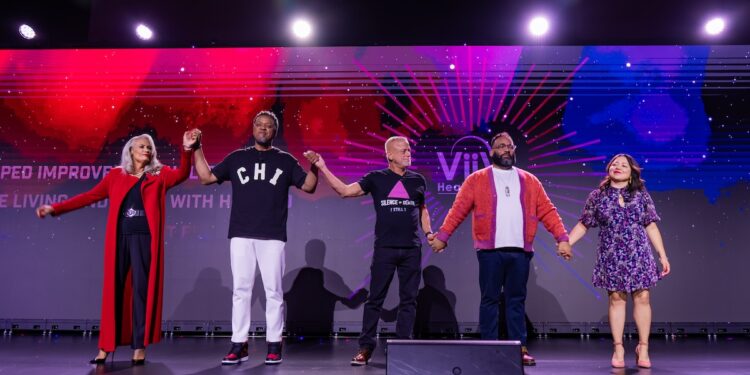At the 2025 U.S. Conference on HIV/AIDS, ViiV Healthcare’s plenary session “Beyond Belief” highlighted the groundbreaking changes in the life expectancy for a person diagnosed with HIV/AIDS. It also showcased individuals who are thriving after being diagnosed, and how spirituality plays a role in their recovery. Among them is the iconic Rae Lewis-Thornton, now 63. Nearly four decades ago, she was told her diagnosis was a death sentence.
Table of Contents
What the Beyond the Belief Session Covered
The session featured intergenerational elements. They were designed to highlight the new stages of life. The idea is to expand conversations and stay connected to the condition. As people live longer with the condition, this session was the first step in helping us realize we need to adapt our thinking.
The session brought “real stories of aging, community, and many forms of belief that continue to move us forward—whether rooted in faith, science, relationships, or lived experience” to thousands of attendees at the conference. “A variety of cultural and historical factors, such as religious and moral belief systems and political ideologies, can manifest in health care systems’ policies,” according to the American Medical Association Journal of Ethics. Interacting with faith-based communities and respecting patients’ faith has proven to be an effective strategy for engaging populations that need it the most.

Rae Lewis-Thorton is Fighting for Policy Changes and Access to Treatments
Lewis-Thornton made her presence known in the session. As an icon in the community, she uses her voice to fight for policy changes and increased access to treatment. Her life stands as an example of the hope found by many today. “There were no medicines to treat HIV, and funeral directors were afraid to even bury somebody with HIV, so you know it was a cruel time, and so I kept my infection a secret for seven years. I think I told five people those first seven years,” she told Black Health Matters.
She went from living with the secret to speaking out boldly, going beyond fear and shame, bolstered by her belief. She told the story of how one can thrive after a diagnosis. Since then, her voice has encouraged many others. Lewis spoke on the importance of incorporating spaces that hold the beliefs of others as something of value alongside useful scientific information.
Living Beyond Belief
“When we begin to think about where we are with this disease? Yeah. I am living beyond belief, and I think a lot of that has to do with science, and I think a whole lot of it has to do with God,” said Lewis-Thorton.
A 2024 study at Harvard argued that “In a reimagined clinical and public health system, spiritual factors would be routinely considered in creating person- and community-centered policy and practice.” It identified spirituality as a determinant of health.

“It’s important that we all work to make HIV a smaller part of people’s lives who are living with HIV, and that includes reducing stigma that includes holistic health and seeing people less as whole humans and the wholeness of their humanity, meaning that it is important that we recognize all parts of us and all parts of our health,” said Randevyn Piérre, Head of U.S. External Affairs, ViiV Healthcare.
Reality star and entrepreneur Dwight Eubanks shared how his place of worship led to his prostate cancer diagnosis earlier this year.
You can’t see that wholeness unless you go to where the people are, something the session was determined to do.
A 2022 report from the U.S. Department of Health and Human Services’ Office of Minority Health (OMH), Black women were 10 times more likely than non-Hispanic White women to be diagnosed with HIV.
When we examine the numbers and who is being infected, community organizations must be part of the response.
“Black women are in the church, and so it’s important that organizations that do this work like this speak to us in our social location, that they speak to us at the center of who we are,” said Lewis-Thornton.
“People who are living with this disease need something greater than themselves, something higher than themselves in their lives. And so, whatever they, however they, address their spirituality. I think it is significant to live with this disease. You can’t not do it. You know, we are not super people and we cannot do it alone, and I think we need to believe in something greater than us.”
But Black women can’t be both the most infected and the only ones stepping up to treat them. How will faith-based organizations commit themselves to this work in the future?
They Incorporated Trap Gospel to Deliver the Message to Gen Z
Trap gospel, a rising trend, was incorporated into the musical portion of the session. It represented a shift towards inclusion, reflecting the way millennials and Gen Z communicate. Lewis-Thornton described the energy present during the musical interlude.
“Everyone receives messages and communications differently, depending on the messenger, depending on the channel. So, for us to be able to amplify this crucial information around HIV, and to prioritize awareness in different ways, is really an awesome opportunity that’s really critical,” said Randevyn Piérre, Head of U.S. External Affairs, ViiV Healthcare.
“ViiV is really committed to reaching communities in ways that are relatable, and in ways that are relevant, and in ways that resonate and music resonates in many ways with many people, and so we wanted to try something that we’d seen, popping up, in different spaces online that folks were really reacting to and sort of make it relatable and tie it into the experience at USCHA.”
Resources
























